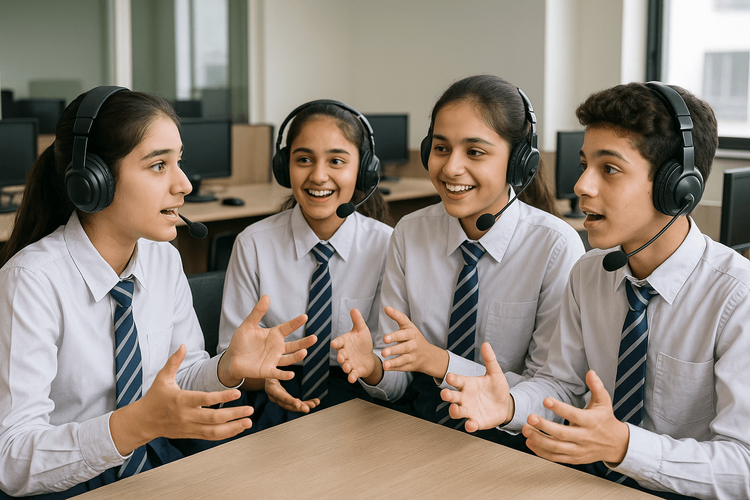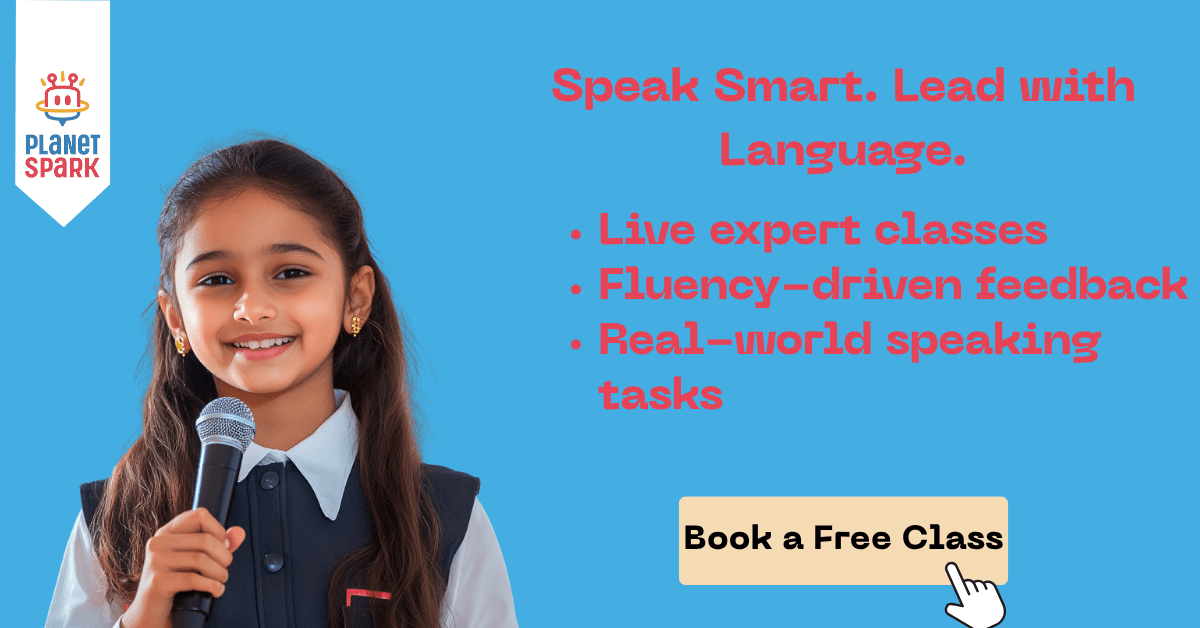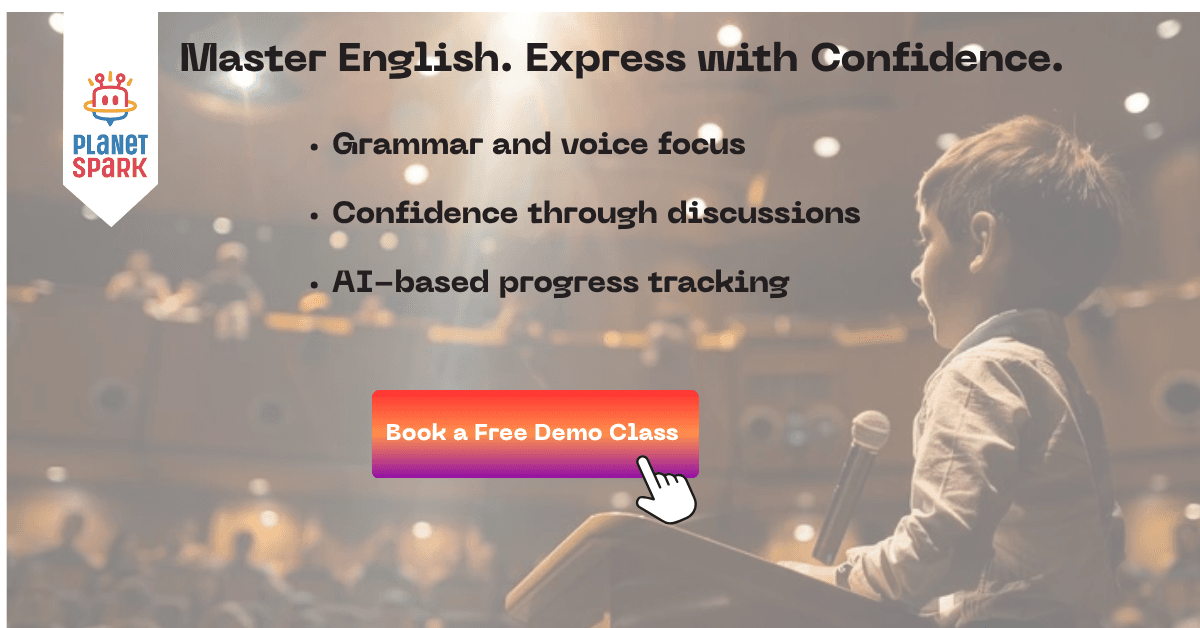Which Language Should I Learn? Top Picks and Smart Tips for 2025

Table of Contents
- The Power of Language Learning for Children
- Factors to Consider Before Choosing a Language
- Top 7 Languages Worth Learning in 2025
- The Psychological Benefits of Learning a New Language
- Personal Use Cases: Real-Life Scenarios for Language Learnin
- Language Learning Trends in 2025
- Don't Just Learn a Language- Learn to Use It Confidently
- Different Learning Styles and the Right Language for You
- Emotional and Cultural Connections with Languages
- Use Digital Tools to Support Language Learning
- How PlanetSpark Helps You Learn and Speak Confidently
- How PlanetSpark Helps You Choose and Master the Right Langua
- Benefits of Learning a New Language with Communication Skill
- Tips to Stay Consistent While Learning a New Language
- PlanetSpark: Not Just Language- It’s a Life Skill
- Recommended Languages Based on Career Goals
- How Communication Skills Accelerate Language Learning
- Conclusion
- FAQs
In a world that is more connected than ever, being bilingual- or even multilingual- is a significant asset. Whether you're a student, working professional, or a curious learner, the question “Which language should I learn?” pops up at some point. But with thousands of languages spoken globally, how do you pick the one that aligns with your goals?
This blog will walk you through the top languages to learn, factors you should consider before choosing, and how platforms like PlanetSpark can help you master not just a language but also communication skills for life.
Why Learn a New Language
Language is not just about grammar and vocabulary. It opens doors to new cultures, global career opportunities, academic growth, and deeper human connections.
Some top reasons to learn a new language include:
Boosting your career potential
Enhancing cognitive abilities and memory
Improving communication and public speaking skills
Traveling and experiencing new cultures
Strengthening academic performance
And remember, PlanetSpark’s Communication Skills Program ensures that language learning is not boring. We teach through interactive live sessions, AI-driven feedback, and real-world speaking practice.
The Power of Language Learning for Children
When considering which language to learn, the conversation often revolves around career and travel. But for parents, another important question arises: Which language will benefit my child the most in the future?
Starting language learning at a young age has immense cognitive and social benefits. Research shows that children who learn a second language early on exhibit better problem-solving skills, creativity, and memory retention. They are also more culturally aware and empathetic.
That’s why platforms like PlanetSpark are crucial in a child’s developmental journey. At PlanetSpark, children are not just taught a language- they’re taught how to communicate confidently, think critically, and express ideas with clarity. The platform’s expert trainers combine communication techniques with practical, interactive learning sessions to build a child’s fluency and global readiness.
PlanetSpark's communication skills program incorporates essential components like:
Vocabulary enrichment
Accent neutralization
Public speaking skills
Grammar and syntax confidence
Real-life conversation simulations
If you're unsure whether your child should begin with English, French, or another global language, PlanetSpark can help assess their learning goals and interests through personalized sessions. This ensures that they not only learn a language but also thrive in it.
Factors to Consider Before Choosing a Language
Before jumping into a course or app, consider these essential factors:
1. Your Goals
Ask yourself:
Do I want to study abroad?
Am I aiming for a promotion?
Do I love anime and want to understand it without subtitles?
Your purpose will guide your language choice.
2. Global Relevance
Some languages give you access to global markets. For instance, learning Spanish opens up Latin America, Spain, and parts of the U.S.
3. Difficulty Level
Tonal languages like Mandarin or Vietnamese may be more difficult than German or French for English speakers.
4. Access to Learning Resources
Languages like Spanish and French have more online and offline resources than lesser-known languages.
5. Cultural Affinity
Love K-pop? Korean might be for you. Adore French cinema or cuisine? Go with French.

Top 7 Languages Worth Learning in 2025
1. English – The Global Connector
Whether it’s business, science, or the internet, English dominates. It’s a must-learn for non-native speakers.
Already know English? Improve your fluency and confidence with PlanetSpark’s communication skills course!
2. Mandarin Chinese – The Economic Powerhouse
Spoken by over 1 billion people, Mandarin is the most spoken native language in the world. It's essential if you plan to work in Asia or global trade.
3. Spanish – The Gateway to Latin America
With 20+ countries using Spanish, it's perfect for travel, international business, and even healthcare roles in the U.S.
4. French – The Language of Diplomacy
Spoken in 29 countries, French is ideal if you’re interested in international relations, art, or fashion.
5. German – Europe’s Engineering Hub
Germany is a powerhouse in manufacturing and innovation. Learning German can give you an edge in tech, science, and engineering.
6. Japanese – For Tech and Pop Culture Lovers
Japan is known for technology, gaming, and anime. Japanese can be tough, but deeply rewarding.
7. Arabic – The Language of Oil and Opportunity
Arabic is in demand for business, diplomacy, and intelligence roles. It’s also one of the official UN languages.
The Psychological Benefits of Learning a New Language
Beyond career and academic growth, language learning deeply enhances personal development. Several studies show that learning a new language can delay the onset of dementia, increase gray matter density, and strengthen cognitive flexibility. When you switch between two languages, your brain essentially gets a workout, sharpening memory and problem-solving skills.
Additionally, language learning teaches patience, discipline, and resilience. You’ll face moments of frustration and confusion, but overcoming those challenges builds mental stamina- a transferable life skill.
Personal Use Cases: Real-Life Scenarios for Language Learning
Let’s explore how different people benefit from different languages:
A student planning to study abroad may benefit most from learning German, French, or Japanese, depending on their desired university location.
An entrepreneur expanding to global markets could focus on Mandarin Chinese or Spanish to access broader customer bases.
A travel blogger or digital nomad will benefit from knowing Spanish, Arabic, or Thai, helping them connect with local communities during their travels.
Parents raising bilingual children often start with English or French, as these are commonly taught and supported in international schools.
A working professional in India wanting to work for multinational firms might find English proficiency, combined with basic German or French, a game-changer.
Recognizing your personal use case helps narrow down your options and stick to your goals with a clear sense of purpose.
Language Learning Trends in 2025
Recent language learning trends are shifting due to global politics, economy, and technology:
Mandarin Chinese is gaining ground as China continues to expand its economic influence.
Korean is on the rise thanks to K-pop, Korean dramas, and tech companies like Samsung and LG.
Portuguese is gaining traction due to Brazil’s growing market.
Sign Language is being embraced for inclusivity in education and media.
Moreover, AI-powered tools like language-learning chatbots, pronunciation trainers, and speech simulators are transforming how we learn. PlanetSpark, for instance, uses AI-driven fluency feedback that helps learners correct their speech in real time- a feature that traditional classroom models rarely offer.

Don't Just Learn a Language- Learn to Use It Confidently
Many learners quit halfway because they focus only on grammar rules and vocabulary lists. The key to success is not just learning a language, but practicing it in real contexts- and that’s where PlanetSpark stands out. It ensures students not only know a language but also use it confidently.
If you’re investing time and energy into learning a language, make sure your training platform supports you holistically: with a structured curriculum, personalized mentoring, and continuous speaking practice.
Different Learning Styles and the Right Language for You
Everyone has a unique learning style- and believe it or not, your preferred style can influence which language might be easier or more enjoyable for you to learn.
Auditory learners often thrive with languages that have distinct sounds and musicality. Languages like Italian, Spanish, and Japanese might suit you well because of their rhythmic and phonetic nature.
Visual learners may do better with languages that use unique scripts, like Korean (Hangul) or Arabic, where the shape of characters becomes part of the memorization process.
Kinesthetic learners, who learn best by doing, may benefit from immersion-based languages like English or French, where live conversations, gestures, and contextual practice play a big role.
Understanding your learning style can help you make a more informed decision and stay committed in the long run.
Emotional and Cultural Connections with Languages
Sometimes the best language to learn is the one you feel emotionally or culturally drawn to. Do you enjoy French films, Korean music, or Japanese anime? Cultural interests are powerful motivators. They keep you engaged and connected to the process.
Here’s how cultural connection enhances learning:
It turns lessons into experiences.
You absorb not just vocabulary, but values and expressions.
You build empathy and global awareness.
This emotional layer makes your learning deeper and more meaningful. At PlanetSpark, this is taken seriously- classes often include interactive speaking activities, roleplays, and cultural insights that help learners understand the tone, etiquette, and real-world usage of their target language.
Use Digital Tools to Support Language Learning
In today’s world, you’re not limited to textbooks or formal classes. Technology can be your biggest ally. If you're wondering "which language should I learn," consider starting with a basic trial using apps and platforms to explore what feels right.
Here are some tools you can use:
Duolingo / Memrise for casual vocabulary building.
YouTube channels for free tutorials and native speaker conversations.
Language exchange apps like Tandem or HelloTalk for real-time chatting.
Flashcard apps like Anki to boost memory retention.
And when you’re ready to turn basic skills into real fluency, PlanetSpark provides 1:1 live sessions with experts who guide you with structured, goal-oriented methods. The transition from casual app-based learning to professional communication fluency becomes seamless with PlanetSpark’s platform.
How PlanetSpark Helps You Learn and Speak Confidently
At PlanetSpark, we believe language learning is not just about reading and writing. It’s about speaking confidently and thinking in that language. That’s why we focus on:
Live 1:1 Classes with Expert Trainers
Personalized coaching that adapts to your level and pace.
AI-Powered Fluency Feedback
Instant, intelligent reports on pronunciation, vocabulary, and fluency.
Communication + Language Integration
Our curriculum teaches grammar, vocabulary, AND public speaking skills- so you become not just fluent but impactful.
Real-World Conversation Practice
From debate to storytelling to situational dialogues, our learners engage in real communication, not textbook repetition.
Master Any Language with PlanetSpark
Start speaking with confidence today. Join PlanetSpark’s communication and language programs now!
How PlanetSpark Helps You Choose and Master the Right Language
PlanetSpark doesn’t just teach English. It builds confident communicators. So even if English is your target language, or if it’s the base language helping you learn others, you get comprehensive support for developing:
Clear pronunciation
Fluent speaking
Situational vocabulary
Emotional expression
Cultural etiquette
Through its Communication Skills Program, PlanetSpark helps learners:
Speak with clarity and confidence
Engage in group discussions
Deliver speeches and debates
Ask and answer questions correctly
Handle interviews and real-world scenarios
PlanetSpark’s expert-led English courses can be your launchpad into the world of multilingual fluency.
Benefits of Learning a New Language with Communication Skills
When language is paired with effective communication training, the results are powerful:
You learn faster through speaking.
You gain confidence in real-life scenarios.
You improve articulation and vocabulary usage.
You enhance your ability to express thoughts clearly.
That’s why PlanetSpark’s approach is trusted by thousands of parents, learners, and professionals globally.
Go Beyond Grammar
Build real communication skills with every language lesson at PlanetSpark.
Tips to Stay Consistent While Learning a New Language
Set a Goal: “I’ll speak French fluently in 9 months.”
Make it Fun: Watch shows, listen to music, or play games in your target language.
Daily Practice: 15–20 minutes every day is better than 2 hours once a week.
Join a Community: Practice with others via groups or PlanetSpark live speaking sessions.
Reward Progress: Celebrate when you reach milestones, like holding a 5-minute conversation.
PlanetSpark: Not Just Language- It’s a Life Skill
We’re more than a language-learning platform. We help children and teens:
Communicate clearly
Think critically
Speak confidently in interviews, classrooms, and social settings
Give Your Child the PlanetSpark Advantage
Book a free trial and explore our communication skill programs today!
Recommended Languages Based on Career Goals
| Career Path | Recommended Language |
|---|---|
| International Business | Mandarin, Spanish |
| Engineering | German |
| Fashion/Art | French |
| Diplomacy | Arabic, French |
| Tech & Gaming | Japanese |
| Healthcare | Spanish |
Learn communication and language with certified mentors at PlanetSpark.
How Communication Skills Accelerate Language Learning
Language learning isn’t only about vocabulary. It’s about:
Understanding context
Reading social cues
Being confident in group discussions
PlanetSpark’s unique curriculum integrates communication training into language learning, making your journey smoother and more effective.
Conclusion
There’s no one-size-fits-all answer. The best language to learn depends on your goals, interests, and career plans.
But one thing is certain: language learning should come with confidence-building communication training, and that’s where PlanetSpark shines.
Explore our expertly designed, engaging, and futuristic language and communication courses today!
FAQs
1. Which is the best language to learn for career growth?
Mandarin, Spanish, and German are highly recommended for global career prospects.
2. Can I learn a language without going abroad?
Absolutely! Platforms like PlanetSpark provide live, immersive learning experiences from the comfort of your home.
3. Is learning a new language hard?
It depends on the language and your consistency. With the right tools and guidance, it becomes easier and fun.
4. Can kids also learn new languages effectively?
Yes, children pick up languages quickly. PlanetSpark offers customized language and communication programs for kids.
5. How does PlanetSpark’s communication training help in language learning?
PlanetSpark combines language instruction with public speaking and real-time conversations, making learning more practical and effective.
Personalized Communication Report
Record a video to get a AI generated personalized communication report for your child

Hi There, want to try these
tips for your child with
LIVE with our expert coach?
Let's check your child's
English fluency
